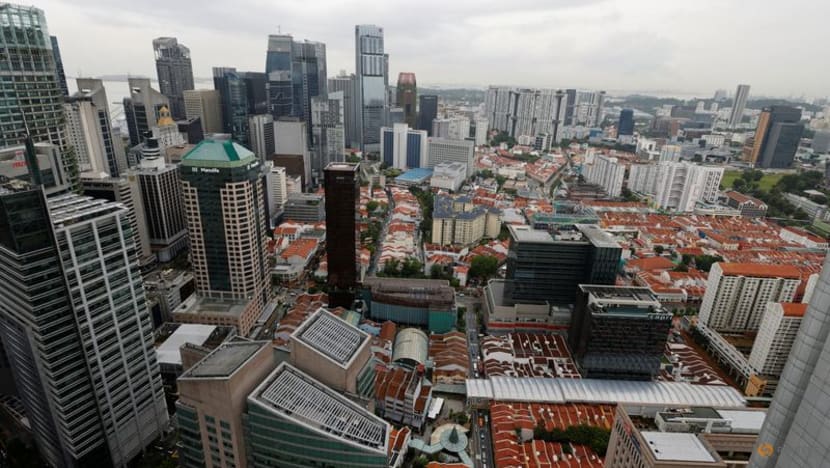New Bill seeks to prescribe simpler way for small businesses to restructure debt or wind up

FILE PHOTO: A view of the central business district in Singapore July 11, 2023. REUTERS/Edgar Su/File Photo
SINGAPORE: Pandemic-hit micro and small businesses will be able to tap on a new programme for simpler, faster and cheaper ways to restructure their debts or wind up, should a new Bill introduced in Parliament on Monday (Oct 5) be passed.
The Ministry of Law has tabled the Insolvency, Restructuring and Dissolution (Amendment) Bill to set up the new Simplified Insolvency Programme (SIP). The programme is needed to help businesses facing financial distress from the unprecedented and ongoing COVID-19 pandemic, it said.
Although business conditions are expected to improve for some industries, it is unlikely they will return to pre-pandemic levels in the near future and financially distressed companies may face insolvency, the ministry said.
READ: Simpler, faster and cheaper process for small companies restructuring or winding down: Shanmugam
While Singapore’s insolvency laws provide processes for companies with substantial assets, the solutions offered may not be suited for micro and small businesses. This is particularly for those that have depleted their resources as a result of the pandemic, it added.
“Most of (the smaller businesses) will find that the business paradigm has changed, and many will find it difficult to continue with their current model,” said Second Minister for Law Edwin Tong.
“Some might want to restructure, to find more time to pay, or to pay in different ways, or perhaps to bring in new partners or to change their focus. Others might find that they want to wind up their business, liquidate, and maybe exit and pivot to something else.
“What we want to achieve with this Bill is to give them a way in which they can avail themselves of a low-cost, quick and also simple process to achieve this,” said Mr Tong, who is also the Minister for Culture, Community and Youth.
Micro and small companies are defined as those with an annual revenue of less than S$1 million and S$10 million, respectively. In 2018, there were about 207,000 micro enterprises and 44,000 small enterprises in Singapore.
To qualify for the SIP, these companies must meet further criteria such as having aggregate total liabilities of below S$2 million, as well as no more than 30 employees and 50 creditors. There will be a cap of S$50,000 on realisable unencumbered assets for companies seeking a simplified winding up process.
READ: Companies in Singapore see lasting benefits of hiring locals, but say a fully-local workforce is not possible
READ: Companies under Scale-up SG programme to receive ‘one-off’ boost in support for a year
SIMPLER PROCESSES
The SIP will have two temporary processes adapted and modified from the existing legal framework to streamline and expedite insolvency proceedings.
Under the proposals for a simpler debt restructuring process, one application to the High Court will be required for a “pre-packaged” scheme of arrangement, instead of the usual two applications.
A moratorium against creditors’ action and restrictions on certain contractual clauses will also automatically kick in, providing breathing room for the company to propose its restructuring plan.
There will also be a lower threshold for creditors’ approval – two-thirds in value – compared with the usual requirement of a majority in number holding 75 per cent in value of debt claims.
For the proposed simplified winding up process, a company that opts for a creditors’ voluntary winding up process will not need to make a court application.
Other features include early dissolution and reduced duties of a liquidator.
“Where the liquidator views the assets of the company are insufficient to meet the expenses of winding up and its affairs do not require further investigation, the company may be dissolved thereafter without the need to take further steps for the administration of the winding up, such as further realisation of assets and distribution of dividends,” said the ministry.
Given that certain complex and costly aspects of a conventional winding up will not be suitable for the simplified process, the scope of the liquidator’s duties will be reduced. For example, a creditors’ meeting will not be convened and the liquidator may only commence legal proceedings to preserve the rights of the company.
If a company is subsequently viewed as unsuitable for a simpler winding up, it may be placed into a court-ordered winding up on the application of the Official Receiver or an interested party.
The SIP will be available for six months from the start of the proposed legislation, but the application period may be extended for a period determined by the minister, the Ministry of Law said.
It will be administered by the Official Receiver, who may assign private insolvency practitioners to administer the cases. Applicant companies will be required to co-pay for the programme.
The new programme will complement other customised restructuring assistance schemes and is part of the Government’s efforts to help businesses facing financial distress, said the ministry.
The Monetary Authority of Singapore said on Monday it will provide borrowers with extra relief, such as by allowing small and medium-sized enterprises (SMEs) to partially defer principal payments for some loans and receive customised restructuring options.
BOOKMARK THIS: Our comprehensive coverage of the coronavirus outbreak and its developments
Download our app or subscribe to our Telegram channel for the latest updates on the coronavirus outbreak: https://cna.asia/telegram















